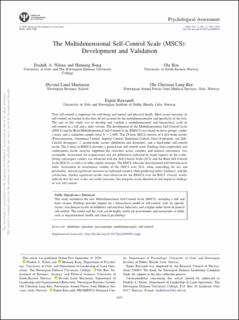| dc.description.abstract | Trait self-control is important for well-being and mental and physical health. Most extant measures of self-control are limited in that they do not account for the multidimensionality and specificity of the trait. The aim of this study was to develop and validate a multidimensional and hierarchical scale of self-control in a full and a short version. The development of the Multidimensional Self-Control Scale (MSCS) and the Brief Multidimensional Self-Control Scale (BMSCS) was based on focus groups, a pilot, a main, and a validation sample (total N = 2,409). The 29-item MSCS consists of 6 first-order factors (Procrastination, Attentional Control, Impulse Control, Emotional Control, Goal Orientation, and Self-Control Strategies), 2 second-order factors (Inhibition and Initiation), and a third-order self-control factor. The 8 items in BMSCS provides a general trait self-control score. Findings from exploratory and confirmatory factor analyses supported the structures across samples, and internal consistency was acceptable. Assessment for acquiescence and sex differences indicated no major impacts on the scales. Strong convergent validity was observed with the Self-Control Scale (SCS) and the Brief Self-Control Scale (BSCS), as well as to other similar concepts. The MSCS subscales discriminated well between each other. Assessment of incremental validity of the MSCS over SCS, when controlling for sex and personality, showed significant increases in explained variance when predicting habits, hardiness, and life satisfaction. Similar significant results were observed for the BMSCS over the BSCS. Overall, results indicate that the new scales are useful measures that integrate recent theoretical and empirical findings of trait self-control. (PsycInfo Database Record (c) 2020 APA, all rights reserved) | |
